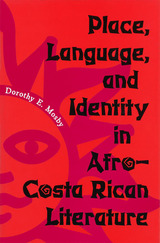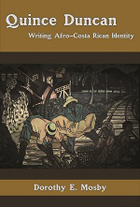2 books about Costa Rican literature

Place, Language, and Identity in Afro-Costa Rican Literature
Dorothy E. Mosby
University of Missouri Press, 2003
In Place, Language, and Identity in Afro-Costa Rican Literature, Dorothy E. Mosby investigates contemporary black writing from Costa Rica and argues that it reveals the story of a people formed by multiple migrations and cultural transformations. Afro–Costa Rican writers from different historical periods express their relation to place, language, and identity as a “process,” a transformation partly due to sociohistorical circumstances and partly in reaction against the national myths of whiteness in the dominant Hispanic culture. Black writers in Costa Rica have used creative writing as a means to express this change in self-identity—as West Indians, as Costa Ricans, as “Latinos,” and as a contentious union of all these cultural identifications—as well as to combat myths and extrinsic definitions of their culture.
Mosby examines the transformation of identity in works by black writers in Costa Rica of Afro–West Indian descent as particular national identities find common ground in the expression of an Afro–Costa Rican identity. These writers include Alderman Johnson Roden, Dolores Joseph, Eulalia Bernard, Quince Duncan, Shirley Campbell, and Delia McDonald, all of whose works are analyzed for their use of language and their reflections on place and exile. Their works are also read as articulations of generational shifts in the assertion of cultural and national identity. Mosby convincingly argues that Afro–Costa Rican literature emerged out of the African-derived oral traditions of Anglo–West Indian literature. She then goes on to show how second-generation writers included this literary tradition in their work, while fourth-generation poets refer to it only through occasional allusions.
With the current growth of interest in Afro-Hispanic and Afro-Latin American cultural and literary studies, this book will be essential for courses in Latin American and Caribbean literature, comparative studies, Diaspora studies, history, cultural studies, and the literature of migration.
[more]

Quince Duncan
Writing Afro-Costa Rican and Caribbean Identity
Dorothy E. Mosby
University of Alabama Press, 2013
Quince Duncan is a comprehensive study of the published short stories and novels of Costa Rica’s first novelist of African descent and one of the nation’s most esteemed contemporary writers.
The grandson of Jamaican and Barbadian immigrants to Limón, Quince Duncan (b. 1940) incorporates personal memories into stories about first generation Afro–West Indian immigrants and their descendants in Costa Rica. Duncan’s novels, short stories, recompilations of oral literature, and essays intimately convey the challenges of Afro–West Indian contract laborers and the struggles of their descendants to be recognized as citizens of the nation they helped bring into modernity.
Through his storytelling, Duncan has become an important literary and cultural presence in a country that forged its national identity around the leyenda blanca (white legend) of a rural democracy established by a homogeneous group of white, Catholic, and Spanish peasants. By presenting legends and stories of Limón Province as well as discussing the complex issues of identity, citizenship, belonging, and cultural exile, Duncan has written the story of West Indian migration into the official literary discourse of Costa Rica. His novels Hombres curtidos (1970) and Los cuatro espejos (1973) in particular portray the Afro–West Indian community in Limón and the cultural intolerance encountered by those of African-Caribbean descent who migrated to San José. Because his work follows the historical trajectory from the first West Indian laborers to the contemporary concerns of Afro–Costa Rican people, Duncan is as much a cultural critic and sociologist as he is a novelist.
In Quince Duncan, Dorothy E. Mosby combines biographical information on Duncan with geographic and cultural context for the analysis of his works, along with plot summaries and thematic discussions particularly helpful to readers new to Duncan.
[more]
READERS
Browse our collection.
PUBLISHERS
See BiblioVault's publisher services.
STUDENT SERVICES
Files for college accessibility offices.
UChicago Accessibility Resources
home | accessibility | search | about | contact us
BiblioVault ® 2001 - 2024
The University of Chicago Press









